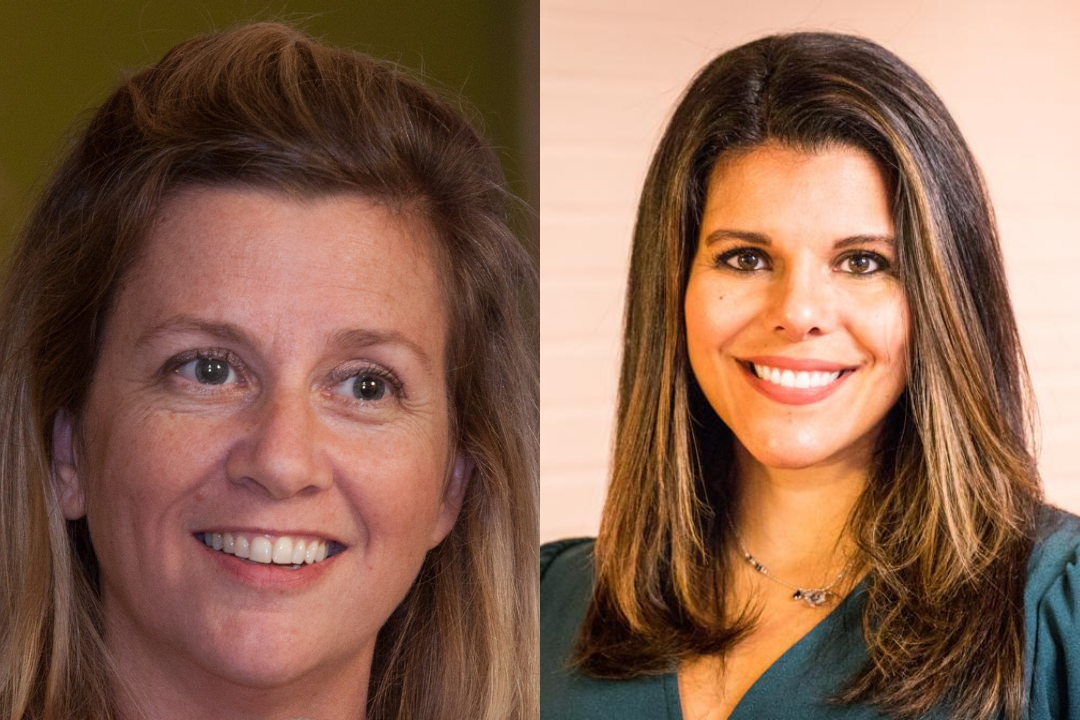Kristen Grimm, president of Spitfire Strategies, a woman-owned, strategic communication firm dedicated to advancing racial, economic and social justice, and Vivian Salama, a national security reporter for The Wall Street Journal are joining the Columbian College of Arts and Science’s School of Media and Public Affairs (SMPA) as the 2021-2022 Terker Distinguished Fellows.
In their roles, they will participate in class discussions, student lunches and public events throughout the academic year.
“I am thrilled to welcome Kristen Grimm and Vivian Salama as SMPA’s new Terker Distinguished Fellows. Both of these women bring impressive backgrounds in journalism and strategic political communication,” said Silvio Waisbord, SMPA director and professor of media and public affairs. “I am excited about the opportunity to have them participate in classrooms and events and exchange ideas with our students during this academic year.”
Established by Bruce and Cindy Terker in 2010, parents of 2013 SMPA graduate Jennifer Terker, the Terker Distinguished Fellows in the Media and Public Affairs program brings exceptional professionals from the fields of media, political communication and public affairs to SMPA each academic year.
Grimm has over 30 years of experience in public interest communication and campaigns. She has an extensive portfolio of clients around the world, working with, among others, the Ford Foundation on human rights in the global south, the Bill and Melinda Gates Foundation on education reform and the Media and Democracy Fund on online privacy.
In 2002, Grimm, noticing a dearth of women-run communications companies, started Spitfire Strategies and created the Smart Chart, a free tool designed to help mission-driven organizations craft an actionable and effective communications plan. The success of the tool led her to work with clients on issues like increasing child health care coverage, aiding the Gulf Coast’s recovery after the 2010 BP oil spill and launching an executive training program to teach CEOs the skills needed to run communicating organizations.
Prior to starting her own company, Grimm was an intern with a small firm promoting Nelson Mandela’s 1990s stadium tour. She eventually became president of the company.
“Working in communications enables you to set the national agenda—but you have to know how to get your message across, attract the media’s attention and persuade other people to echo what you are saying and understand why it is important,” she said.
Grimm currently serves on the boards of Grist and the Windward Fund, and is on the advisory board for the Narrative Initiative. She is a member of the 2014 Class of Henry Crown Fellows at the Aspen Institute and serves in the moderator corps for Aspen.
As a Terker fellow, Grimm sees her role as “a co-conspirator with students or faculty members who want to think about change in the world,” she said. She emphasized that while social media has broadened the communications landscape, it has also made it more challenging for messages to stand out. “Whether they are passionate about climate change or creating an anti-racist society, I want students to know that they have an enormous opportunity to move their priorities to the top of the social agenda,” she said. “But it’s not easy. They’re going to have to be creative and do the hard work.”
Salama has covered U.S. foreign policy and national security for nearly two decades, reporting from more than 80 countries for media outlets such as The Wall Street Journal, CNN, NBC News and the Associated Press.
As a White House correspondent, she broke major stories including the Trump administration’s controversial travel ban and the two impeachment inquiries. A fluent Arabic-speaker, Salama previously served as Iraq bureau chief for the Associated Press, and has been based in the United Arab Emirates, Pakistan, Egypt, Israel and the Palestinian Territories. She marched alongside protesters in several Arab capitals during the 2010 Arab Spring. She is the author of the children’s book The Long Journey Home, (Archway Publishing, 2019), which chronicles a young boy’s journey as a refugee from war-torn Syria.
As a veteran international reporter, Salama said she hopes to convey to students the importance of “keeping an open mind” and approaching stories without preconceived biases. “You can be the most well-read, highly-educated person, but you can’t truly understand a part of the world until you have experienced it, until you have lived there, worked there and studied a peoples’ language, culture and religions,” she said.
In addition to reporting from the Middle East and South Asia, Salama has worked in North Korea, the Balkans and across East Asia, sub-Saharan Africa, Europe and South America. She began her career as a journalist with television networks in New York City and Providence, R.I. “Journalism is a 24/7 job. It’s consuming and there are a lot of sacrifices involved,” she said. “But I hope students know that, at the end of the day, the work we do as journalists is essential to a functioning democracy.”


